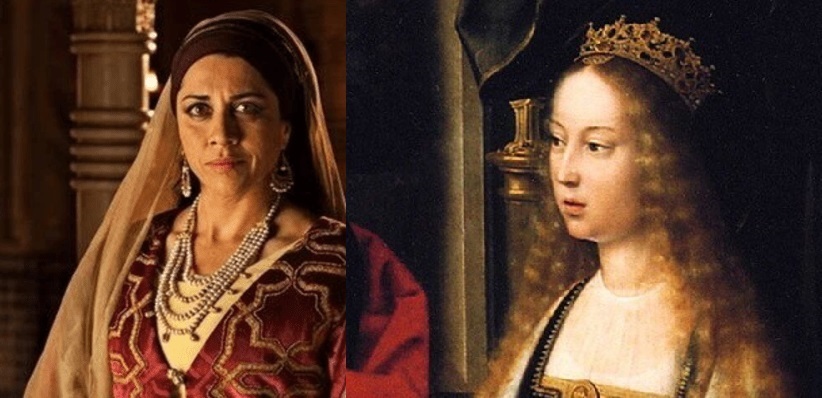The Warring Queens & The Prophesy of Doom.
Posted on 3rd May 2020

Isabella I of Spain, (born 22 April 1451) was the titular monarch of Aragon and jointly ruled the rest of Spain with her husband Ferdinand, although she seemed to be the ruling hand guiding most matters of state throughout Spain. During her reign, she significantly brought the crime rate down and unburdened the kingdom of the enormous debt her brother had left behind. Her most notable achievement achievement was the conquest of the Islamic kingdom of Grenada, in the course of which, she came up against another feisty lady: Aisha bint Muhammad ibn al-Ahmar, Aixa (herself of royal birth), a politically active queen, wielding a great amount of influence on matters of state during the final years of the Emirate of Granada. Aixa bore Muley Hacén (Emir of Grenada) three children; Boabdil, Yusuf, and Aixa. For many decades the Emirate of Greanada had paid a yearly tribute to the Catholic Monarchs of Spain in exchange for peace between the kingdoms. Breaking with tradition, Muley Hacén refused to pay the tribute, resulting in a deterioration of the relationship with Isabella, who sent them threatening messages saying that they should pay up. As a sign of his defiance (and against the advice of Aixa) he invaded the Christian fortress town of Zahara de La Sierra. Many Christian town people were slaughtered and the peace that had been brokered over centuries via a yearly tribute to Castile was finally over. To add to Aixa’s utter consternation, Muley Hacén refused to acknowledge her son Boabdil as the rightful heir of Granada. Muley Hacén’s negative attitude towards his son relates to the fact that on the day of his son’s birth in 1460, astrologers claimed that if he were ever to take the throne, Boabdil would be the last Islamic Emir of Granada. Boabdil was thus imprisoned in the Tower of Comares within the vicinity of the Alhambra Palace. Consequently Aixa aligns herself to a rival opposition party and Boabdil escapes.
After a bloody civil war, Aixa managed to make Boabdil the Sultan of Granada and Muley Hacén went into exile. Isabella (taking advantage of the internal strife of the Muslims) built the fortress town Santa Fé and set up an encampment just 13 kilometers away from Granada. After finally winning back Malaga she turned her final strategy to the conquest of the city of Granada itself. By this time Aixa was firmly in control of the state, but it was too late - most of her territories had been lost and Granada was being besieged, to make matters worse, her son Boabdil was a nervous wreck, and failed to rally his troops. lnstead he sent out desperate requests for external aid. By way of response, the Sultan of Egypt mildly rebuked Isabella (and Ferdinand) for the Granada War, but that was it. Boabdil also requested aid from the Kingdom of Fez (modern Morocco), but no reply is recorded by history. Bribery of important officials was also rampant, and at least one of the chief advisers to Boabdil seems to have been working for Isabella the entire time. Immediately after the city's fall, Aixa is said to have rebuked her inconsolable son by saying: “Do not cry as a woman for what you could not defend as a man.” Isabella's terms of surrender were exceptionally generous. There was no looting nor executions. No one would be forced to change religion, not even former Christians who had converted to Islam. The Muslim population could stay or leave as they pleased, they were not even disarmed. Boabdil was even offered money and the rulership of a small principality in the mountainous Alpujarras - a Muslim area that would have been difficult to control in any case. Isabella had nothing to do with the eviction of all Muslims from Spain, that was decreed by King Philip III of Spain on April 9, 1609. She had five children, one of which was Catherine of Aragon. She died on the 26 November 1504.
